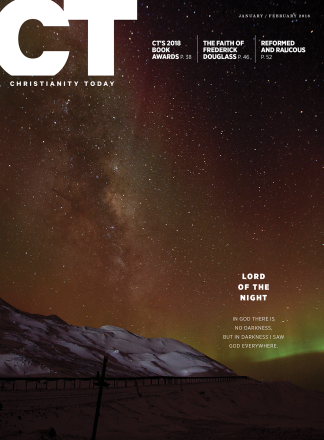The Rolling Stones were right—about all of us. We really can’t get no satisfaction.
When Keith Richards and Mick Jagger wrote the song that would become their first No. 1 hit in the United States, many in the church were scandalized by the candor in “(I Can’t Get No) Satisfaction.” Yet the song hinted at a surprisingly biblical theme: The places we often seek satisfaction (notably for The Rolling Stones, sex and consumerism) fail to satisfy.
Imagine a guitar riff behind the expressions of disenchantment in Ecclesiastes, and they sound pretty scandalous too. Nearly all of us are looking for satisfaction in some way. And most of us still have a natural inclination to look in two places: our own appetites and consumerism.
We try to satisfy our appetites for love, power, food and drink, sex and other forms of pleasure, sleep, and more. And when we feel unsatisfied in some way, it’s natural to turn to these appetites and think, “If I just had more. . . .” Consumerism not only feeds on our natural appetites but also warps and inflates them for the sake of profit. A constant stream of enticements creates urgency over things we don’t need. So when we want to feel more satisfied, it’s no surprise we often think like consumers and focus on something to acquire: “If I just had that. . . .”
With either approach, we are doomed to repeat the wretched enlightenment of our predecessors, to discover that our best attempts to satisfy ourselves leave us with a gnawing hunger.
Even though we Christians can be caught up in following our own appetites and the whims of consumerism, most of us accept the idea that they will not lead us to true satisfaction. So we take what seems a logical next step: We seek satisfaction in our relationship with Christ. But what if this approach is also doomed to fail? What if God doesn’t want us to be satisfied by our Bible studies, devotionals, times of prayer, and acts of service done in his name? What if he wants us to live unsatisfied?
When we come to Christ expecting satisfaction, we inadvertently approach him as if he is the answer to both our natural appetites and our consumeristic desires. Rather than ask him to transform our desires, we expect him to take them away or morph himself into the solution we’re wanting. We approach him as either a product or a solution. And God is neither.
Paraphrasing Pascal
If I live as long as my grandmothers did, half my life is now behind me. I can look back and remember all the times I told myself my life would be complete someday—when I was finished with school, when I was doing the work I wanted to do, when my husband and I had children, when we could afford the lifestyle our neighbors enjoyed. One of the bittersweet gifts of midlife is the opportunity for a new acceptance of reality. From this vantage point, it’s clear that in one sense, “someday” will never come. And in another sense, “someday” is here to stay. Most of what I will build, in a tangible sense, I have already built.
Like so many before me, I naturally take stock of many things: my accomplishments so far, my level of satisfaction with where I am and where I foresee I will be during the second half of my life. And despite my knowing and following Christ since I was four years old, I am not satisfied with or by that relationship. I long for more. I long for what God first intended us for, which has not yet been restored to any of us. And I suspect God is not interested in making my life completely satisfying.
This statement might offend anyone who is convinced that the mark of a true Christian is an absence of human needs and desires. After all, many have internalized the suggestions of a popular quotation commonly (and erroneously) attributed to Blaise Pascal: “There is a God-shaped vacuum in the heart of every man which cannot be filled by any created thing, but only by God, the Creator, made known through Jesus.” Some further paraphrase and speak of “a God-shaped hole” in need of divine filler.
There is truth behind this saying, yet Christ does far more than make our lives completely fulfilling. Repentance and redemption are more than transactional requirements for a good life. God is far greater than a quick fix, and his ultimate plan for re-creation and redemption is not a mere afterthought to a happy life. In some ways, a relationship with Christ intensifies our longings as God shapes them into visions of what he wants us to desire.
Biblically Unsatisfied
It makes sense that when we acknowledge that nothing in this world will satisfy our souls, we follow with an affirmation that God will. And we’re right to do so. God will not disappoint us; he will satisfy our longings in far greater ways than we can imagine. The problem is that we expect that God will fill us, on our terms, now. In the words of C. S. Lewis, “If we consider the unblushing promises of reward and the staggering nature of the rewards promised in the gospels, it would seem that Our Lord finds our desires not too strong, but too weak. . . . We are far too easily pleased.”
The trouble is, while we may want God to make our lives as fulfilling as we can envision, God envisions something far greater. He wants us to long for life in his presence and the full redemption of creation. And when we look at the lives of people in Scripture, we see longing rather than the satisfaction we might expect.
The ancient prophets heard directly from God and had the privilege of sharing his truth with God’s people. Yet they lived lives marked by suffering, not satisfaction. After his moment of greatest victory, Elijah was depressed and suicidal (1 Kings 19). Jeremiah, known as “The Weeping Prophet,” wrote the Book of Lamentations and cursed the day he was born (Jer. 20). For these men, intimate communication with God made life both purposeful and painful.
The apostle Paul’s writings reveal another man who was intimate with God and unsatisfied. “For to me, to live is Christ and to die is gain,” he wrote (Phil. 1:21). Paul knew his ministry was important, yet people who are satisfied by the life they lead don’t wish for death. In his letter to the Romans, Paul is frank about our awkward position in this life, sometimes called the “now and not yet.” We have the blessings of God’s grace and Jesus’ redemption now, yet we wait for them to be fully visible. We wait for our true identity as children of God to be fully revealed (Rom. 8:18–25).
The apostle Peter and the writer of Hebrews both actually encouraged their readers not to be satisfied. “Like newborn babies, crave pure spiritual milk,” Peter wrote, “so that by it you may grow up in your salvation, now that you have tasted that the Lord is good” (1 Pet. 2:2–3). The writer of Hebrews went a step further and wished people would crave more than milk (Heb. 5:13–14). Far from asking their readers to be satisfied, these writers longed for them to live spiritually hungry.
The apostle John, like Paul, wrote about the “now and not yet”: “Dear friends, now we are children of God, and what we will be has not yet been made known” (1 John 3:2). In the Book of Revelation, John’s guide describes believers in heaven, alluding to the prophet Isaiah: “ ‘Never again will they hunger; never again will they thirst.’ . . . For the Lamb at the center of the throne will be their shepherd; ‘he will lead them to springs of living water’ ” (Rev. 7:14–17). These followers of Christ arrive hungry and thirsty, to be finally satisfied and led to streams of living water to have their appetites fully satiated. This is striking! If a relationship with Jesus were fully satisfying in our lives on earth, why would we need our hunger and thirst satisfied in heaven?
Several years ago, my sister ran the Chicago Marathon, and I had the privilege of cheering her on. Early in the race, we saw the first finishers cross the line. These were elite runners from all over the world, and their finishing times were awesome. But even these runners, among the greatest in the history of the world, were exhausted when they finished. And like all the runners, they were hungry and thirsty.
Along the route, plenty of water stations gave opportunities to hydrate. Energy bars and gels gave them calories and nutrients. But they were expending far more than they could consume. No matter how much they took in along the way, they would have been in desperate need of replenishment at the end. Only when the race was over could they meet their needs.
This image—the depleted runner—comes to mind when I think of these saints in Revelation, crossing the “finish line” into eternity. As the writer of Hebrews entreats us to do, they have “run with perseverance,” their eyes locked on Jesus (Heb. 12:1–2). They have hungered and thirsted along the way, and they have suffered during the race. They have sustained themselves with Living Water and the Bread of Life. But they are still in desperate need of what only God can give. And now they will be truly, eternally satisfied.
Confident Hope
While we can find deep fulfillment in a relationship with Christ, it’s normal and healthy to feel unsatisfied by the relationship we can achieve with him now. Perhaps this is even what God wants for us. As we are more intimate with God, he does not want us to decide we’ve had enough; instead, he wants us to desire more. He does not want to merely satisfy our desires; he wants to transform them.
Rather than simply redirect our appetites and consumerism toward Christ, let’s question whether satisfaction is a legitimate goal for our lives. We can, instead, learn to accept and even embrace our lack of satisfaction and lead intentionally unsatisfied lives. And when we let go of our pursuit of satisfaction, we open ourselves to all the other things Christ intends to do in and through us.
So if not satisfaction, what is a worthy goal for our lives? In the words of the Westminster Shorter Catechism, “to glorify God, and to enjoy him forever.” When we reorient ourselves around God, rather than expect him to orient himself around us, we stop wondering what is worth living for.
Christ will not disappoint us; we don’t need to lower our expectations of him. Instead, we do well to raise them and live in anticipation of the satisfaction to come. We can embrace the unsatisfied life now precisely because we live in hope that our longings will be met.
When we desire what God desires, we can be sure we will receive what we long for. As Jesus said, “Blessed are those who hunger and thirst for righteousness, for they will be filled” (Matt. 5:6).
Amy Simpson is a life and leadership coach, speaker, and author of Blessed Are the Unsatisfied: Finding Spiritual Freedom in an Imperfect World (InterVarsity Press, 2018). Find her at AmySimpson.com and on Twitter @aresimpson.
Was this article helpful? Did we miss something? Let us know here.










